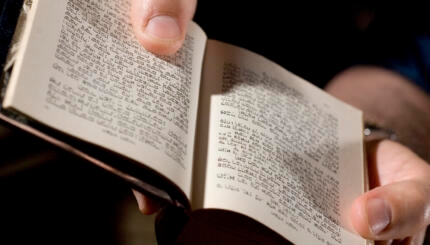The first paragraph of the Shema, usually called the Veahavta after its first word, begins with a call to love God. But we anticipate that theme of love with a blessing before the recitation of the Shema that focuses on God’s love for us.
This blessing is recited prior to both the morning and evening recitation of the Shema, though the wording changes slightly. The version of the blessing that we recite as part of the morning service is sometimes called Ahavah Rabbah, “deep is Your love,” after its first words. The text of Ahavah Rabbah asserts that God’s love for us is boundless and that the mitzvot are an expression of that love.
Commandments might strike us as a strange way to show love. After all, if we want to remind someone that we love them, we might write them a sweet note, or cook their favorite food, or surprise them with a gift. We probably would not remind them to do the dishes or take out the trash.
Yet when we frame the relationship between us and the divine as a metaphorical parent-child relationship, the words of this blessing suddenly resonate in a different way. Ask children what rules their parents have that show love and they will point to things like prohibiting cooking without adult supervision or requiring showers and tooth brushing. Parents also easily cite examples: A child should make their own lunch to demonstrate independence, go to school to learn and maximize their potential, get in bed at a reasonable hour to be rested and functional in the morning.
With your help, My Jewish Learning can provide endless opportunities for learning, connection and discovery.
Kids may not always be happy to follow rules, but they can usually acknowledge that they are expressions of parental love. That understanding may not lead them to excitedly make their lunches or stop arguing about bedtime, but they may at least understand their parents’ motivation, and that may lead them to follow the rules — or at least balk at them less.
The language of Ahava Rabbah imparts a similar hope: “Grant us discernment and understanding. Then will we study Your Torah, heed its words, teach its precepts and follow its instruction, lovingly fulfilling all its teachings.”
We ask for the capacity to understand the mitzvot, God’s rules for us. Only after that, we express an intention to lovingly fulfill them. Our ability to experience the Torah and its mitzvot as divine gifts is contingent on our understanding the ways they have the power enrich our lives with a meaningful structure, to protect us, and to help us improve the world around us.
When we can experience mitzvot in that way, when we feel God’s love for us through the rules that we have been given, we are ready to recite the Shema and Veahavta and to express a love of the divine in return.
Rabbi Paula Rose is the assistant rabbi of Congregation Beth Shalom in Seattle, Washington.



